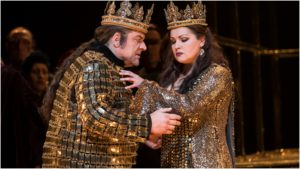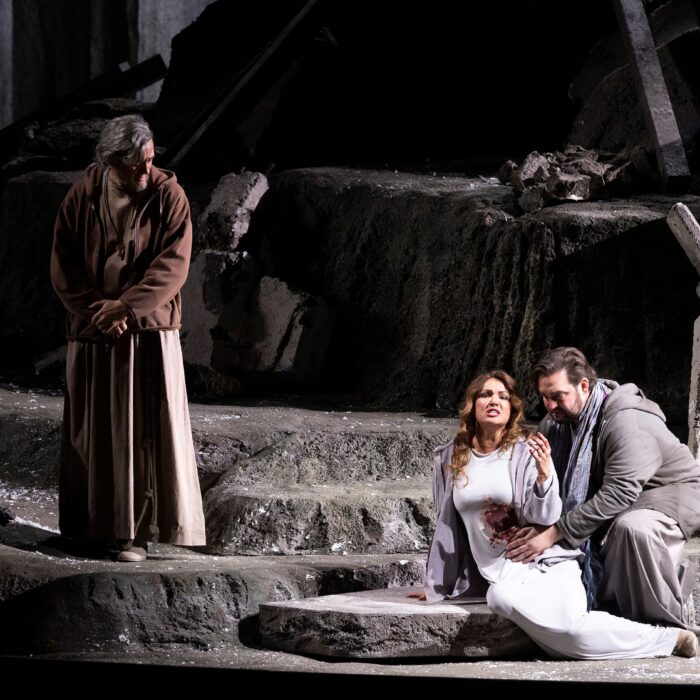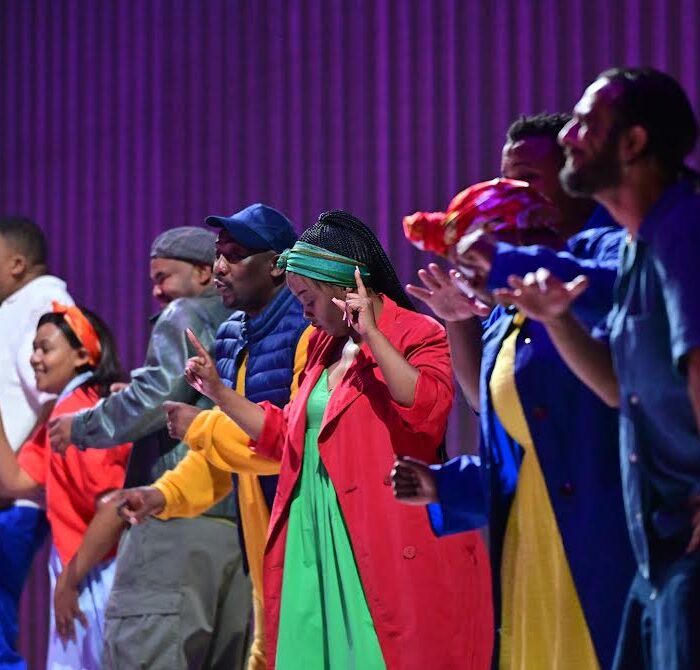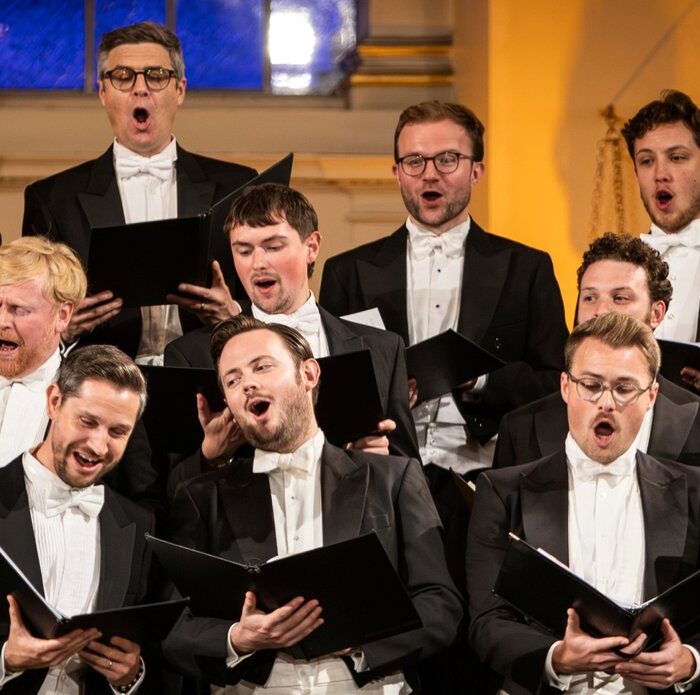
Royal Opera House Season 2017-18 Review – Macbeth: Anna Netrebko & Zeljko Lucic Shine In Unsatisfactory Production
By Sophia LambtonDirector Phyllida Lloyd’s 2002 production of Verdi’s “Macbeth” doesn’t need a revival to age. Cluttered with too many literal symbols – Lady Macbeth attempting to wash blood off in the bath, Duncan clad in a glittery gold cloak that Macbeth dons when assuming the throne, the presence of a running tap onstage as the two killer spouses sing of their compulsive need to become clean – the rendering swiftly begins to be predictable. Ultimately the entire presentation of the story is so obvious it doesn’t manage to appear so much experimental as it does a picture book retelling of the Shakespeare play for children.
Each of “Macbeth’s” major themes is threaded though the spectacle with very little interest in the aim of subtlety, beauty or even structure. The murderous husband and wife appear to live in a dark vault of walls made from huge matte black squares. Their environs do not appear as haunting as they do resemblant of large bars of extra dark chocolate. When the opera climaxes in Macbeth and Macduff’s duel, the fight of the two men is executed in a gilded and rotating cage. The staging tells us everything the opera does with minimal nuance: greed entraps its victim in an all-consuming bloodlust; bloodlust equals hubris which brings death.
And yet while there are numerous paraphernalia onstage that pose as obstacles – most notably the running tap that seems intrepidly to pour its water for some fifteen minutes at the end of the first act – the musicality of this rendition seeks to want to trounce them all.
An Obsessed King
Rather than being the tyrannical and boorish dictatorial king we often witness headlining the opera, the Macbeth of Željko Lučić is a man relentlessly obsessed – although the targets of his rapt fixation switch from power to pervasive paranoia. Gliding along most of the vocal lines with ease, the darkest register of his stentorian baritone is able to switch rapidly between the timid execution of a fearful line and its immediately brazen, counteractive neighbor. With a near-total clarity of notes he’s able to coat many early lines with viscous calculation. Brisk changes from fear-ridden, sprinting loud notes to their hushed and dismal counterparts are executed with a flawless regulation.
Most impressively, Lučić can steer the control of his vibrato at the service of any given vocal expression, allowing it to oscillate between two polar opposites whilst never cutting loose from vocal purity. His cunningly lethal forebodings – such as “Banco, l’eternità apre il suo regno (Banquo, the afterlife is opening its kingdom for you)” – are ejected from a menacing, hubristic king. But by the time he’s ordering the ghost to flee (“Fuggi, regal fantasima” in the third act) – he’s nothing but a trance-engrossed and incapacitated victim of insanity whose notes often have equal textural value to portray the character’s hypnotic state.
A Powerhouse Leading Lady
Anna Netrebko doesn’t mitigate the stark contrast of what could arguably be the opera’s real protagonist – Lady Macbeth. Famously designed for what its own composer termed an “ugly, evil, voice,” Netrebko here unleashes her instrument to regions untested. From the moment of her anti-heroine’s spoken recital of the letter, “Nel dì della vittoria,” hers is a voice soaked in a venomous and toxic tar. It is the lowest section of her register which most accomplishes expression of her character’s unruly bloodlust; a cavernous and echoing metallic sheen over the alto notes that in their incrementally intimidating slow crescendos call to mind the stick of a suspended cymbal as it brushes the gold instrument before the ultimate percussive strike. Her command, “Tu notte, ne avvolgi di tenebre immota (Night, wrap us in still darkness),” is portentous in a premeditated, clever way that stays clear of the bellicose, inelegant approach we often see.
While Netrebko’s careful application of slow diminuendi and salient accentuations of select phrases steal the show theatrically, it is by no means a consummate interpretation of the role. Most of the faults lie in wavering top notes of long length and sudden insertions of breath either mid-word or mid-phrase. Much of the coloratura sung in “Or tutti sorgete” is interrupted with perforations of inhalations throughout ‘oh’s or ‘ah’s that lead up to notes; certain words seem rushed. Vocal ascensions that have to be stretched out – like the Lady’s realization that Duncan is to arrive at the palace tonight, “Duncano sarà quì.. .quì… quì la notte?” – begin to waver near the phrase’s end. It is by no means a question of Netrebko’s timbre – which can sound emboldened and completely indestructible as she sings shorter lines of recitative such as “Regna il sonno su tutti (Sleep rules over everyone)” in Act one. This is a matter purely of technique: her breath does not always endure the more difficult lines or transitions. “Una macchia è quì tuttora,” the Lady’s final aria in which she feels she is unable to scrub off the non-existent blood stains on her skin, is by far the best executed: every note performed with an identical hypnosis easily symbolic of how Lady Macbeth’s thoughts have transgressed consciousness. Her tentative diminuendi on those final “andiam’s” are especially eerily haunting.
Star Casting
As Banquo Ildebrando d’Arcangelo offers a trenchant bass-baritone voice whose propulsive vibrations lend ominousness to his description of the bird of ill omen in the first act. The persistent crunchiness in his well-sustained, deliberately abrasive timbre nonetheless does not abate when Banquo tells his son they must escape; it lacks sullenness and chooses mostly to accentuate prophetic cogency.
Tenor Yusif Eyvazov makes his Royal Opera debut as the ultimately victorious Macduff. He drenches the brief span of solo time he has – the aria “Ah, la paterna mano” in the final act -with a despairing, sombre quality across a very silvery, vibrato-ridged, high-pitched voice; an instrument that is not only malleable but could potentially perform coloratura roles some day. His style is still a little operatically declamatory nonetheless and could afford more varying dynamics across vocal lines.
A Classical Approach
Sir Antonio Pappano’s interpretation of the music rivals the traditional takes of the singers with a stalwartly classical rendition of Verdi’s score. The oboes sing presages of motifs in a subtle and serpentine manner; brisk notes on strings are similarly crisp and frightful in their diffidence. The contrast between the dream-like, lulling music symbolizing the main character’s hallucinations – both in the overture in the harp’s notes and when the chorus sings of nymphs and sylphs in the third act – and trenchant, guttural attacks on strings, is constantly refreshingly piquant. To some extent Pappano emphasizes the light, waltz-like quality of many a deceptively serene orchestral underlining slightly too much; never injecting unexpected pieces of rubato here and there. It gets a little staid and sometimes seems restrained for lack of innovative or audacious choices. In certain instances where chords or notes are repeated and there is meant to be voluminous variation, there perhaps isn’t enough. Occasionally the brass are fractionally disjointed in their playing. And yet the execution overall is pure, exits and entrances are consummately punctual and the drones on brass are spookily well-timed to suit the opera’s ambience.
The chorus – mostly of witches – echo admonitions with a flawless, clean-cut harmony that makes it easy for its listeners to ascertain why they hold such a sway over the newly coronated King of Scotland.
Focusing intently on the various performances one easily forgets that the Macbeths are clad in such a way as to resemble children’s party outfits. While the direction strives towards an avant-garde impression and falls short, the whole ensemble stays within the safe confinements of a classic style of opera acting. It may not always be convincing but it doesn’t for the most part stray from technically good singing. That’s already one kind of success.


